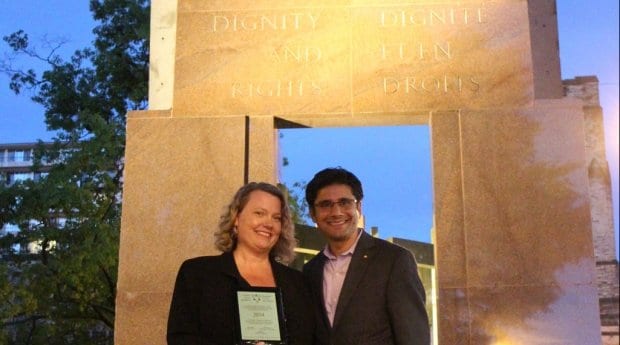The human rights monument is now a beacon in both darkness and light.
Politicians, activists and community members gathered at Ottawa City Hall on June 12, 2015, to celebrate the first lighting ceremony of the Canadian Tribute to Human Rights, also known as the human rights monument. Originally slated to take place at the monument itself, the event was moved indoors due to rain.
“This is truly a milestone moment for our city,” said Yasir Naqvi, MPP for Ottawa Centre, as he addressed the attendees. “This monument defines our city in so many ways. This monument, in its very short history of 25 years, has become the meeting place, the place where all of us of conscience, of mind, of values come together at least a few times a year to talk about and pay tribute to human rights.”
No matter where we come from, anyone who visits the monument can reflect on their own experiences or journeys that relate to human rights, he said.
“Every time I visit this monument — and I have a great honour to represent the community where the monument is located — I always reflect on my own personal journey to Canada,” Naqvi said. “Our journey that saw my father spend nine months as a political prisoner in a country where I was born and where my father led a pro-democracy march.”
The monument is the work of Melvin Charney, a Montreal artist and architect who passed away in 2012. In 1990, the Dalai Lama unveiled the sculpture. Nelson Mandela also visited the site during a visit to Ottawa.
Naqvi said the monument is also significant to the LGBT community; it’s where the annual human rights vigil is held during Capital Pride. Our efforts to promote human rights must continue so that marginalized members of the LGBT community achieve equality in Canada and around the world, he said.
Sarah Evans, vice-president of the Canadian Tribute to Human Rights board, also discussed the importance of the monument to the queer community.
“For the LGBT community, a community to which I belong, this monument has continued to be a touchstone over the last 25 years,” she said. “We have seen vigils of remembrance for those lost to HIV/AIDS. We have gathered there to demand equal access to benefits and also to marriage.”
The idea for the monument came from a group of activists who worked hard to turn their vision into a reality, Evans said, and queer activists like George Wilkes were involved from the very beginning.
Many speakers discussed human rights in connection to the Truth and Reconciliation Commission. Claudette Commanda, executive director of First Nations Confederacy of Cultural Education Centres, talked about her grandfather William Commanda, an Algonquin elder who taught her the importance of humanity, identity and language.
“We are born with a most sacred gift and it is inherent human rights,” Commanda said. “It is our languages that define who we are in creation. It is our languages that define who we are in our culture.”
Oni Joseph, an award-winning poet and member of the Canadian Tribute to Human Rights board, also talked about the connection between indigenous languages and human rights.
“The words equality, dignity and rights are actually written in 72 First Nation languages,” Joseph said. “I remember when the last plaques were unveiled I had the chance to spend time with [former Assembly of First Nations National] Chief [Shawn] Atleo, who was crying because he couldn’t read the words in his language.”
Mayor Jim Watson urged people to go and see the Witness Blanket, which is on display until July 9, 2015, at Ottawa City Hall. Created by indigenous artist Carey Newman, the installation is made up of objects from Indian Residential Schools.
While the monument’s lighting was made possible thanks to a $15,000 grant from the Ontario Trillium Foundation and community donations, Watson joked that the City of Ottawa won’t be covering the electric bill as had been earlier announced.
“I saw them installing the lights and I just wanted to break some news to Catherine,” he said, addressing Councillor Catherine McKenney. “We have an extension cord and it plugs in at your house, so thank you very much for your generosity.”


 Why you can trust Xtra
Why you can trust Xtra


